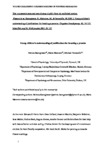Young children's understanding of justifications for breaking a promise
| dc.contributor.author | Kanngiesser, P | |
| dc.contributor.author | Mammen, M | |
| dc.contributor.author | Tomasello, M | |
| dc.date.accessioned | 2021-10-27T12:01:21Z | |
| dc.date.issued | 2021-10-13 | |
| dc.identifier.issn | 0885-2014 | |
| dc.identifier.issn | 1879-226X | |
| dc.identifier.other | 101127 | |
| dc.identifier.uri | http://hdl.handle.net/10026.1/18180 | |
| dc.description.abstract |
There are sometimes legitimate reasons for breaking a promise when circumstances change. We investigated 3- and 5-year-old German children's understanding of promise breaking in prosocial (helping someone else) and selfish (playing with someone else) conditions. In Study 1 (n = 80, 50% girls), preschoolers initially kept their own promise in all conditions. When they eventually broke their promise, 3-year-olds’ justifications mostly referenced salient events, whereas 5-year-olds also referenced social norms. In Study 2 (n = 65, 49% girls), 5-year-olds preferred others’ promise-breaking more in prosocial than selfish conditions; 3-year-olds showed the reverse pattern. Three-year-olds’ justifications focused on desires, whereas 5-year-olds focused on relevant events. Overall, 3-year-olds were able to offer justifications, but 5-year-olds started to distinguish what counted in the eyes of others as “good” and “bad” reasons for promise breaking. | |
| dc.format.extent | 101127-101127 | |
| dc.language | en | |
| dc.language.iso | en | |
| dc.publisher | Elsevier | |
| dc.rights | Attribution-NonCommercial-NoDerivatives 4.0 International | |
| dc.rights | Attribution-NonCommercial-NoDerivatives 4.0 International | |
| dc.rights | Attribution-NonCommercial-NoDerivatives 4.0 International | |
| dc.rights | Attribution-NonCommercial-NoDerivatives 4.0 International | |
| dc.rights.uri | http://creativecommons.org/licenses/by-nc-nd/4.0/ | |
| dc.rights.uri | http://creativecommons.org/licenses/by-nc-nd/4.0/ | |
| dc.rights.uri | http://creativecommons.org/licenses/by-nc-nd/4.0/ | |
| dc.rights.uri | http://creativecommons.org/licenses/by-nc-nd/4.0/ | |
| dc.subject | Moral development | |
| dc.subject | Promises | |
| dc.subject | Reasons | |
| dc.title | Young children's understanding of justifications for breaking a promise | |
| dc.type | journal-article | |
| dc.type | Journal Article | |
| plymouth.author-url | https://www.webofscience.com/api/gateway?GWVersion=2&SrcApp=PARTNER_APP&SrcAuth=LinksAMR&KeyUT=WOS:000711222300002&DestLinkType=FullRecord&DestApp=ALL_WOS&UsrCustomerID=11bb513d99f797142bcfeffcc58ea008 | |
| plymouth.volume | 60 | |
| plymouth.publication-status | Published | |
| plymouth.journal | Cognitive Development | |
| dc.identifier.doi | 10.1016/j.cogdev.2021.101127 | |
| plymouth.organisational-group | /Plymouth | |
| plymouth.organisational-group | /Plymouth/Faculty of Health | |
| plymouth.organisational-group | /Plymouth/Faculty of Health/School of Psychology | |
| plymouth.organisational-group | /Plymouth/REF 2021 Researchers by UoA | |
| plymouth.organisational-group | /Plymouth/REF 2021 Researchers by UoA/UoA04 Psychology, Psychiatry and Neuroscience | |
| plymouth.organisational-group | /Plymouth/REF 2021 Researchers by UoA/UoA04 Psychology, Psychiatry and Neuroscience/UoA04 Psychology, Psychiatry and Neuroscience MANUAL | |
| plymouth.organisational-group | /Plymouth/REF 2021 Researchers by UoA/UoA04 Psychology, Psychiatry and Neuroscience/UoA04 REF peer reviewers | |
| plymouth.organisational-group | /Plymouth/Users by role | |
| plymouth.organisational-group | /Plymouth/Users by role/Academics | |
| dcterms.dateAccepted | 2021-09-28 | |
| dc.rights.embargodate | 2023-10-13 | |
| dc.identifier.eissn | 1879-226X | |
| dc.rights.embargoperiod | Not known | |
| rioxxterms.versionofrecord | 10.1016/j.cogdev.2021.101127 | |
| rioxxterms.licenseref.uri | http://creativecommons.org/licenses/by-nc-nd/4.0/ | |
| rioxxterms.licenseref.startdate | 2021-10-13 | |
| rioxxterms.type | Journal Article/Review |



